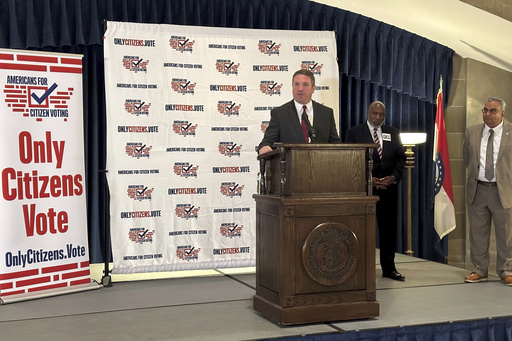
In the current election cycle, voters across numerous states are not only selecting representatives to create and uphold laws, but they are also facing over 140 ballot initiatives that could significantly impact how citizens live, work, and die.
Among the issues on various ballots, ten states are evaluating proposals concerning abortion and reproductive rights. Meanwhile, several other states are deliberating on the approval of marijuana for either recreational or medical purposes. Additionally, numerous proposed initiatives focus on altering future election processes, which includes some aimed at prohibiting noncitizens from voting. Other proposals touch on crucial topics such as wages, taxation, housing, and education.
Many of the proposed measures have emerged through citizen petitions that bypass traditional state legislative processes, while others have been placed on the ballot through legislative actions.
Regarding marijuana legislation, states like Florida, North Dakota, and South Dakota are voting on whether to legalize recreational marijuana for adults. This election represents the third time the issue has been presented to voters in both North and South Dakota. Nebraska residents are also considering two measures that would permit the use of medical marijuana and create regulations for its industry. Currently, approximately half of states permit recreational marijuana, while about a dozen more allow its medical use.
Additionally, Massachusetts voters will decide on a measure that would allow for the legal possession and supervised use of certain natural psychedelics, including psilocybin mushrooms, following similar legislation in Oregon and Colorado.
In terms of immigration, a proposed measure in Arizona would criminalize the act of entering from a foreign country outside designated ports of entry and would restrict individuals illegally present in the U.S. from seeking public benefits through false documentation. This proposal bears similarities to a Texas law currently facing legal challenges, which the U.S. Justice Department argues oversteps federal jurisdiction.
The concept of school choice is also at stake, as Kentucky considers an amendment to its constitution enabling lawmakers to allocate state funds for private schooling. Another initiative in Colorado would enshrine the right to school choice for K-12 students. Meanwhile, Nebraska voters are faced with the decision of whether to revoke a recent state law that uses public funds to pay for private school tuition. Many states already offer some form of assistance for private school costs.
In Missouri, voters are contemplating whether to permit sports betting, a rapidly growing practice in the U.S. since the Supreme Court’s decision in 2018 opened the doors for legalization, with 38 states and Washington, D.C., already on board.
On the taxation front, a proposal in Colorado seeks to impose a sales tax on firearms and ammunition, directing revenues primarily to support crime victims. In North Dakota, a ballot measure could eliminate property taxes entirely, potentially necessitating over $3 billion from state revenues to replace lost income for local governments. South Dakota voters will assess a proposal to abolish the sales tax on groceries, while in Oregon, voters will consider an increase in the minimum tax on large corporations to facilitate a tax rebate for residents.
Housing policies are also under scrutiny as Californians weigh a potential repeal of a 1995 law that restricts local rent control measures. An innovative proposal in Arizona ties property tax refunds to local government enforcement (or lack thereof) against homelessness-related ordinances—allowing property owners to claim refunds if they must bear costs related to the failure to enforce certain regulations.
In Washington state, voters will deliberate on whether to rescind a 2021 law that caps carbon emissions, which necessitates businesses exceeding limits to buy allowances from those below them—a program initially launched by California.
In the realm of voting rights, Republican-led legislatures in eight states—including Idaho, Iowa, and Wisconsin—are proposing constitutional amendments affirming that only citizens are eligible to vote. While a federal law prevents noncitizen voting in federal elections, some localities in states like California and Vermont allow noncitizens to vote in specified local elections.
Moreover, Connecticut is contemplating the authorization of no-excuse absentee voting. Initiatives in Montana and South Dakota propose open primary elections where candidates from all parties would appear on a single ballot. Similar measures in Colorado, Idaho, and Nevada would also introduce open primaries with ranked choice voting. With ranked choice voting currently implemented in Alaska and Maine, Alaska voters will choose whether to reverse changes from a 2020 initiative that enacted open primaries and ranked choice general elections.
In Arizona, two competing proposals aim to define the primary voting mechanism, pitting open primaries against the existing partisan process. Should both measures succeed, the one receiving the most votes would be enacted, pending possible court involvement.
An initiative in Ohio seeks to form a citizen commission for overseeing redistricting, transferring this responsibility away from elected officials.
Lastly, minimum wage adjustments are being addressed with initiatives in Missouri and Alaska proposing gradual increases to $15 per hour alongside requirements for paid sick leave. California’s proposal aims for a gradual rise to $18 an hour, while a Nebraska proposal would enforce sick leave provisions without altering wages. A Massachusetts initiative seeks to equalize the minimum wage for tipped employees with other workers over time, contrasting the Arizona measure that would allow tipped workers to earn less than the minimum wage, provided their tips elevate their total pay above that threshold.
In West Virginia, voters will determine whether to amend the state constitution to prohibit medically assisted suicide, which is permissible in ten states and Washington, D.C.
